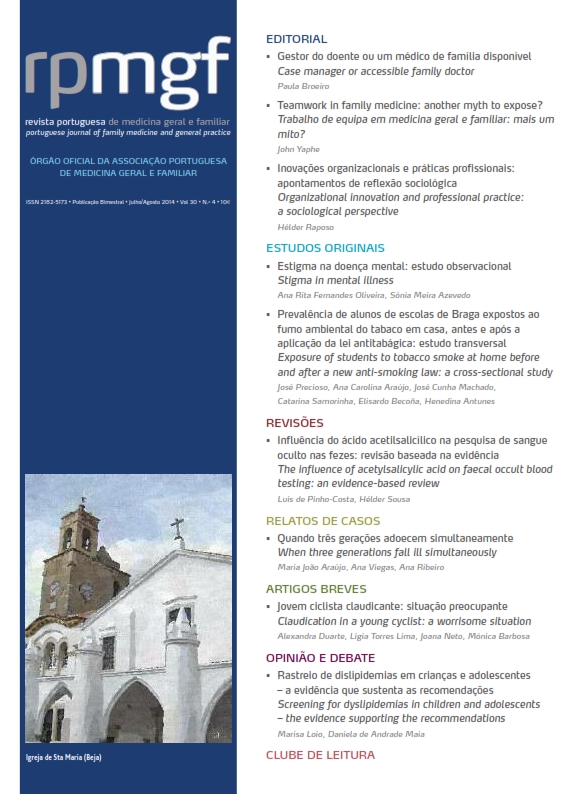Stigma in mental illness
DOI:
https://doi.org/10.32385/rpmgf.v30i4.11347Keywords:
Stigma, Mental IllnessAbstract
Objectives: To estimate the prevalence of stigma in relation to mental illness in a general practice population and its association with socio-demographic characteristics or previous contact with mental illness. Type of study: Cross-sectional Setting: Unidade de Saúde Familiar Santiago do Centro de Saúde Arnaldo Sampaio (Leiria) and Centro de Saúde da Marinha Grande. Population: Patients 18 years of age and older registered in the two health units Methods: A convenience sample of patients was used. Socio-demographic factors, a personal history and a family history of mental illness were assessed. The AQ-9 questionnaire of Corrigan was used to measure stigma. Univariate and multivariate analysis were performed with significance set at the 0.05 level. Results: The study sample consisted of 206 patients with an average of 45 years. The attributes of mental illness receiving the highest scores in the AQ-9 questionnaire were the need for help, coercion for treatment, and segregation from the community. Married patients and those with children had the greatest agreement with the statement regarding coercion for treatment (Student t p = 0.008, ANOVA p=0.018). A lower educational level was associated with higher agreement with statement regarding the need for segregation of the mentally ill (ANOVA p<0.001). No association was found between stigma and a personal or family history of mental illness. Conclusion: Evidence of stigma from mental illness was found in this population. Marital status and education were associated with stigma. No association was found between demographic variables and other items in the AQ-9.Downloads
Downloads
Published
Issue
Section
License
The authors will assign to the RPMGF the sole right to publish and distribute the content of the manuscript specified in this declaration via physical, electronic, broadcasting or any other medium that may come into existence. They also grant the RPMGF the right to use and exploit this manuscript, in particular by assigning, selling or licensing its content. This permission is permanent and takes effect from the moment the manuscript is submitted, has the maximum duration allowed by applicable Portuguese or international law and is of worldwide scope. The authors further declare that this assignment is made free of charge. If the RPMGF informs the authors that it is not going to publish their manuscript, the exclusive assignment of rights ceases forthwith.
The authors authorise the RPMGF (or any entity it may appoint) to act on their behalf when it believes that copyright may have been infringed.





